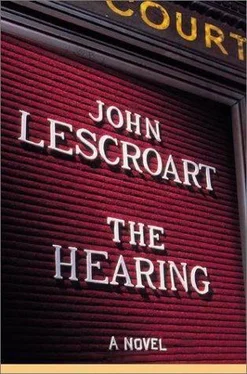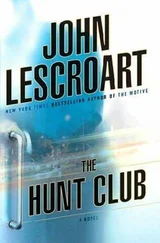John Lescroart - The Hearing
Здесь есть возможность читать онлайн «John Lescroart - The Hearing» весь текст электронной книги совершенно бесплатно (целиком полную версию без сокращений). В некоторых случаях можно слушать аудио, скачать через торрент в формате fb2 и присутствует краткое содержание. Жанр: Триллер, на английском языке. Описание произведения, (предисловие) а так же отзывы посетителей доступны на портале библиотеки ЛибКат.
- Название:The Hearing
- Автор:
- Жанр:
- Год:неизвестен
- ISBN:нет данных
- Рейтинг книги:3 / 5. Голосов: 1
-
Избранное:Добавить в избранное
- Отзывы:
-
Ваша оценка:
- 60
- 1
- 2
- 3
- 4
- 5
The Hearing: краткое содержание, описание и аннотация
Предлагаем к чтению аннотацию, описание, краткое содержание или предисловие (зависит от того, что написал сам автор книги «The Hearing»). Если вы не нашли необходимую информацию о книге — напишите в комментариях, мы постараемся отыскать её.
The Hearing — читать онлайн бесплатно полную книгу (весь текст) целиком
Ниже представлен текст книги, разбитый по страницам. Система сохранения места последней прочитанной страницы, позволяет с удобством читать онлайн бесплатно книгу «The Hearing», без необходимости каждый раз заново искать на чём Вы остановились. Поставьте закладку, и сможете в любой момент перейти на страницу, на которой закончили чтение.
Интервал:
Закладка:
'Last weekend, the city suffered a terrible loss. I'm speaking, of course, of Elaine Wager, not only the daughter of our late beloved senator, but in her own right one of the great lights in the city's firmament.' Pratt paused for a sip of water, gathered herself, and went on. 'One of the most difficult lessons I've had to learn on the prosecution side of the bar is that there is real evil cast among us. My training and background has led me to try and understand the causes of anti-social behavior and to seek solutions through incarceration, yes, but also through counseling and education. I remain proud of the programs we've adopted that seek to temper justice with mercy, that have tried to inject compassion and understanding into the judicial process.
'But the events of the past few days have brought home some hard truths and today I am here to deliver a message that may have become blurred in my administration's zeal for fairness, tolerance, and empathy for desperate people who are driven to desperate acts. And that message is this: people who break the law in San Francisco are going to be punished.'
Pratt let the substantial round of applause wash over her, took another sip of water, then waited for silence. When it came, she spoke in a voice thick with conviction – it was time to go into campaign mode. 'There are those who say that I am soft on crime, that I am too compassionate to fulfill the duties of District Attorney. To those people, let me announce what may be correctly interpreted as a sea change in the policy of this administration.
'The police have arrested a man – a homeless man, a drug addict – who has confessed to the murder of Elaine Wager, a murder in the course of which he took her purse, jewelry, and other possessions. California law defines murder in the commission of a robbery as a special circumstances crime and prescribes only two possible penalties – life in prison without the possibility of parole, and death.'
Pratt was aware of the drama of the moment. The silence in the room was perfect – even the waiters were still, hanging on her conclusion.
'I want there to be no mistake. It is the intention of the District Attorney to seek the death penalty in this case. This is the word I'm putting out to the criminal element in this city, the line that today I draw in the sand – street violence, all violent crime, stops here. The law will be enforced. For as long as I remain District Attorney, here is the policy of my office: if you are unfortunate or dispossessed, mercy will still have its place…' her hands gripped either side of the podium as she looked out over the multitude, 'but if you break the law, justice will trump mercy every-' she brought down her fist, 'single-' again, the fist, 'time.'
After a short stunned silence, a man at one of the front tables began to applaud and it was as though a dam had broken. The ensuing ovation brought the entire dining room to its feet.
8
Sick of conjuring with imponderables, Hardy called a fifteen-minute recess for himself. He stood up, stretched, and walked to the window. Late afternoon, a listless gray day downtown. He and Frannie had their traditional Wednesday date night scheduled to begin in a couple of hours, and Hardy was tempted to call it a day and go wait for his wife at the Shamrock, discuss some philosophical conundrums with his brother-in-law Moses who would be working behind the bar. He could have an early cocktail on the theory that it was always five o'clock somewhere.
He wasn't getting anything done here, that was for sure.
His reaction to Monday's problems with Glitsky and the jail had settled uneasily enough, but after his visit with Cole Burgess yesterday, the whole business lay curdling in his stomach. Something was very wrong, but he really didn't want to get involved any further. He was too close to it, one way or the other. Also, he didn't want to risk a serious rupture in his friendship with Abe over a lowlife such as Cole Burgess – to say nothing of the logistical problems he'd doubtlessly have with his friends Jeff and Dorothy, and her difficult mother.
When the dust cleared, he was all but certain that Cole would cut some kind of deal and get low double digits in the state prison. Every homicide was a manslaughter to Pratt's trial-shy prosecutors. Even the public defender called the city's system a 'plea bargain mill'. Best case, Cole might even get out of San Quentin with his habit broken. In any event, it wasn't Hardy's problem.
What was his problem right now, though, was Dash Logan. The damned guy was proving harder to contact than the Pope, and Hardy's client Rich McNeil was understandably losing some patience.
In the mid-eighties, McNeil had just turned fifty and decided to invest his pension plan money in San Francisco real estate. He could have done better with Microsoft, but back then the stock market made him nervous. In any event, he wasn't complaining. The sixteen-unit apartment building on Russian Hill had cost a hefty $1.5 million when he purchased it for a quarter million down; its most recent appraisal pegged its value at six million plus. Rich was now sixty-four years old, primed to sell the thing and retire.
So here he was, this nice guy and good citizen who'd worked and saved the way good Americans were supposed to, and instead of some carefree years of leisure, he was suddenly looking at some very serious trouble.
A year and a half ago, he'd finally succeeded in evicting Manny Gait, who'd been a tenant in the building for nearly ten years. The tenant from hell, as it turned out.
The first sign of trouble was when he painted his entire unit, including the windows, black. When McNeil had demurred, politely requesting Gait at least to leave the outer windows clear, Gait had not so politely declined. It was his fuckin' place, he said, McNeil could go piss up a rope.
To say that San Francisco's rent control laws favor tenants over landlords is to say that Custer favored Southern belles over the Ogalala Sioux. So when Hardy's client explored the possibility of evicting Mr Gait over the paint job, he found that this would be legally impossible. Gait had his five rooms, he paid his four-hundred dollars every month, and as far as the law was concerned, that apartment was his, and at that price, until he gave it up on his own.
Which he wasn't inclined to do.
Over the years, Gait's one unit became a constant source of dissatisfaction to the other tenants as well, and a regular feature of McNeil's life became dealing with complaints about loud noises, awful odors, unsavory people.
Gait's apartment was just inside the front door to the building on the ground floor, and he decided it was a safer place to keep his Harley than in the garage. Though he ostensibly, and sporadically, worked as a bouncer, he once boasted to McNeil that he really got his money for gas, rent and beer (his only necessities) selling or brokering crack and dope deals to other bikers.
The man himself was a giant – a vulgar, terrifying Neanderthal with an enormous gut, a voluminous, unkempt beard, and a shaved head. He dressed perennially in black – T-shirts and leathers, boots and chains. If he bathed at all – but no, he couldn't have and smelled the way he did. The only problem McNeil had with turnover in his building were the units adjacent to Gait's – over the years, the average tenancy in these units – despite the great location, the cooperative landlord, the reasonable rents – was ten months.
Finally, one happy day eighteen months ago, Gait had suddenly disappeared. McNeil didn't receive his rent check by the tenth of the month, which was the statutory grace period. He immediately served written notice and filed to evict. Under normal conditions, in San Francisco McNeil would have had to wait six months or more before any action would be taken on the filing, but the unprecedented support of every other tenant in the building – all of whom personally showed up for the hearing – convinced the judge that this was an extraordinary situation, and he ruled in McNeil's favor.
Читать дальшеИнтервал:
Закладка:
Похожие книги на «The Hearing»
Представляем Вашему вниманию похожие книги на «The Hearing» списком для выбора. Мы отобрали схожую по названию и смыслу литературу в надежде предоставить читателям больше вариантов отыскать новые, интересные, ещё непрочитанные произведения.
Обсуждение, отзывы о книге «The Hearing» и просто собственные мнения читателей. Оставьте ваши комментарии, напишите, что Вы думаете о произведении, его смысле или главных героях. Укажите что конкретно понравилось, а что нет, и почему Вы так считаете.












